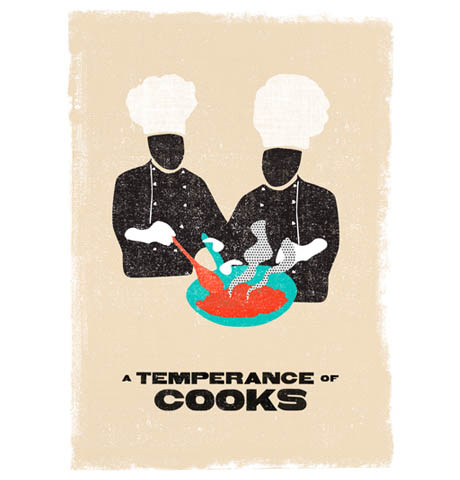
IMAGE: “A Temperance of Cooks,” WOOP Studios.
One of the more delightful eccentricities of the English language is its arcane arsenal of collective nouns, or particular terms for a group of a particular person, place, thing, animal, or idea. Some of these—a pride of lions, a bevy of ladies—date back to the fifteenth century or beyond, but are still in relatively common use; others, such as a superfluity of nuns or a crash of rhinoceroses, sadly, and despite similarly antique origins, are not.
WOOP Studios, a British graphic design firm, was founded in 2010 on the sole premise of creating gorgeous visuals to accompany collective noun phrases. They started, appropriately enough, with animals, which, according to the Oxford English Dictionary’s blog, were the subject of most of the original nouns of assembly: the first official compendium of collective nouns in the English language is the “terms of venery” printed in The Book of St Albans, a 1486 guide to the aristocratic activities of hawking, hunting, and heraldry (“venery” is an archaic Latinate word refering to “the art, sport, and lore of the chase”).

IMAGE: “A Charm of Finches,” WOOP Studios.
However, WOOP’s latest collection takes on collective nouns for groups of people: a disguising of tailors, a neverthriving of jugglers, and a sitting of judges. Among the selection is one of particular interest for Edible Geographers: a temperance of cooks.

IMAGE: Detail from “A Temperance of Cooks,” WOOP Studios.
This is one of the original fifteenth-century terms collected in The Book of St Albans, and it’s a lovely mix of compliment to and slur on the profession. According to WOOP:
Temperance arose from the Old English temperian, which meant to bring something to a required condition by mixing it with something else. In so doing, the temperer is in need of a modicum of moderation, skill, and foresight – which are all perfect qualities for a cook.
So far, so good—but as Alan Davidson notes in The Oxford Companion to Food, historically cooks were stereotyped as quarrelsome, flirtatious, and excessively fond of both violent pranks and alcohol:
In popular belief, cooks were expected to be drunk: the medieval phrase “a temperance of cooks” is heavy with sarcasm, and Chaucer’s cook runs true to type by being so full of liquor that he falls off his horse.
In other words, “a temperance of cooks” is a perfect collective noun—a typically sweet-and-sour, backhanded British compliment, combining an appreciation of the cook’s skill with a sly dig at the profession.

